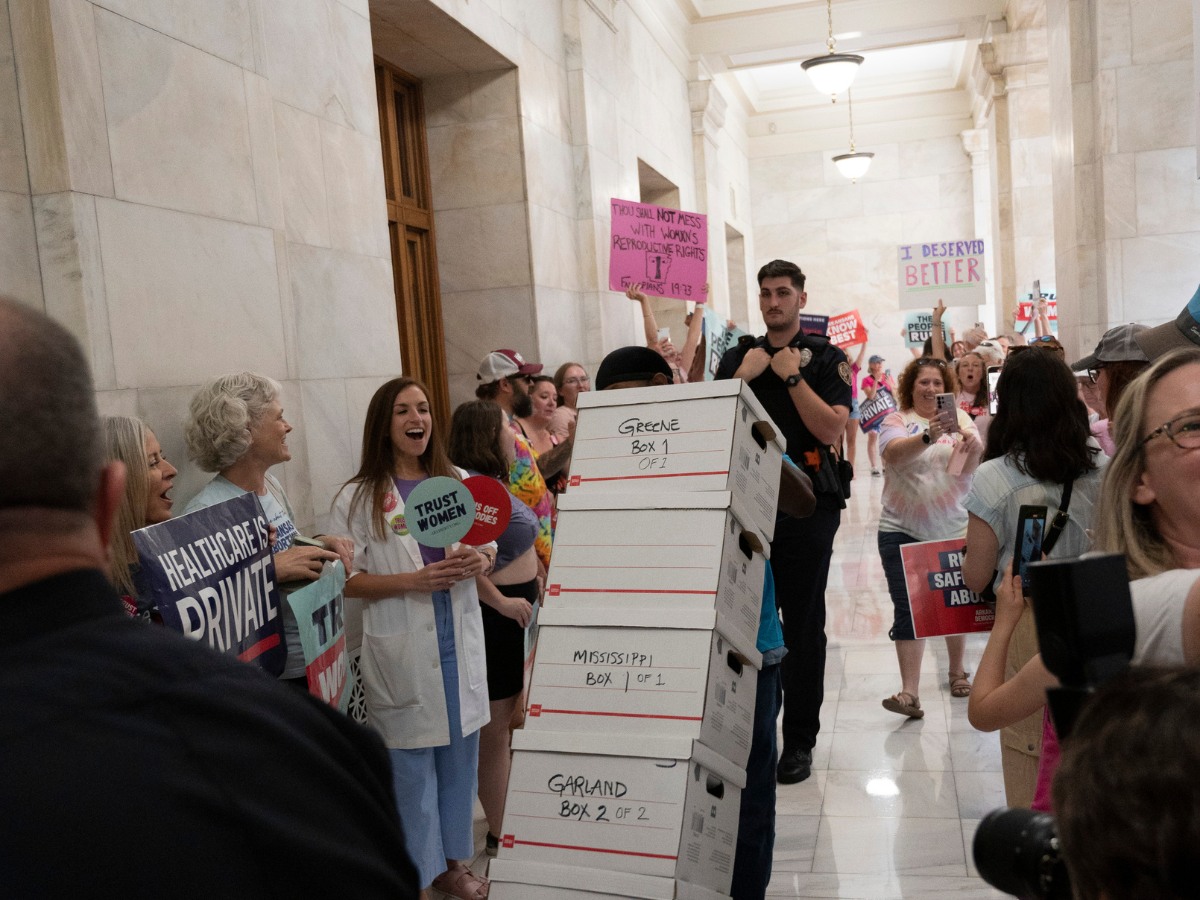In a new filing Monday before the state Supreme Court, the group behind the Arkansas Abortion Amendment fleshed out arguments that Secretary of State John Thurston unlawfully rejected the group’s petition on July 10.
Though the group submitted 101,000 signatures by a July 5 deadline — more than enough to qualify the measure for the November ballot — Thurston threw out the petition a few days later without even counting the signatures, saying organizers had failed to include a piece of paperwork. Arkansans for Limited Government (AFLG), the sponsor of the proposed constitutional amendment, sued Thurston on July 16 and asked the Supreme Court to force him to begin counting.
Attorney General Tim Griffin, whose office represents Thurston, filed a motion to dismiss the lawsuit on Friday. Now, AFLG has responded to Griffin’s motion and Thurston’s ever-shifting explanations for his decision to disqualify the amendment. Here’s their response.
Rebecca Bobrow, a spokesperson for the group, said in a statement Monday that the filing “reemphasizes our belief that the attempt to disqualify the Arkansas Abortion Amendment was illegitimate and undemocratic. We remain hopeful that the Court will rule in a manner that honors our state Constitution and prevents the government from weaponizing paperwork to skirt the will of the people.”
Organizers submitted hundreds of pages of documentation along with their petition sheets on July 5, including a list of paid canvassers who had gathered signatures for the campaign. The one thing they didn’t turn in was a signed document — effectively, a cover sheet — stating that paid canvassers had received proper instructions about the state’s rules on signature collection. Though the group did submit such a document on June 27, eight days before the deadline, that wasn’t good enough for Thurston. Not turning in a separate statement on July 5 rendered the entire petition invalid, he said.
AFLG says the June 27 statement does meet the requirement. But even if it doesn’t, the group also argues that the requirement cited by Thurston can’t be used to disqualify a petition this early on in the state’s multi-step counting process. State law enumerates a list of specific reasons why signatures (or whole petition sheets) could be disqualified at this early stage — but the document in question isn’t one of those reasons. The secretary of state’s office itself has argued as much in previous court cases, the group says.
In its response filed Monday, the group also addressed an argument from Thurston and Griffin that the June 27 statement shouldn’t count because it was signed by Allison Clark. Clark works for a company that contracted with AFLG to hire, train and manage canvassers, including compliance with all legal requirements. But the law requires the “sponsor” of the amendment to sign the statement, and Griffin contended in his motion last week that because Clark was herself a paid canvasser, she cannot also be considered a “sponsor.”
That’s incorrect, Arkansans for Limited Government argues.
“Clark was acting as an agent of AFLG,” the filing says. “Nothing in the statute prohibits a canvasser, paid or unpaid, from acting as an agent of a sponsor (or, for that matter, acting as another sponsor). To follow the Secretary’s [Thurston’s] logic would mean that no sponsor, as an individual or individual working on behalf of a sponsor entity, could also be a paid canvasser. Such an interpretation limits that individual’s ‘core political speech’ and likely violates the First Amendment to the U.S. Constitution.”
The group also doubled down on its claim that Thurston’s office had misled organizers in the runup to the deadline by “assuring petitioners they had met the requirements” for submission:
The Secretary does not dispute that AFLG asked the Secretary’s office what it would need to sign and submit on the day of filing and that his office responded only with the Receipt for Initiative or Referendum Petition … that, at the filing, the Secretary’s attorneys and representatives assured petitioner Lauren Cowles [AFLG’s executive director] that she had filed the necessary paperwork with her submission … that no Sponsor Affidavit was turned in with the complete list of paid canvassers on July 4 because his office told Clark that it was not required … or that he has in his office all of the information required by the statutes, provided by AFLG. Petitioners continually tried to follow the correct procedures and the Secretary’s office repeatedly told them they were doing so, before the Secretary abruptly rejected their petition. This bait and switch was unfair, and the Secretary should be estopped from rejecting petitioners’ submission.
Will those arguments hold water with a state Supreme Court that’s become increasingly conservative? We may know as soon as this week; the court typically issues decisions on Thursdays.
Supporters of the abortion amendment may face an uphill battle, but they haven’t given up hope yet. The response filed today urged the justices to take into account the fundamentally democratic nature of the petition process, which is enshrined in the Arkansas Constitution.
“The Secretary’s actions have thwarted the will of the people,” it says. “AFLG is a grassroots group, with hundreds of volunteers collecting the vast majority of the 101,525 signatures submitted for the Amendment. Petitioners, and the people they represent, exemplify the very spirit of the initiative process the Constitution protects.”

